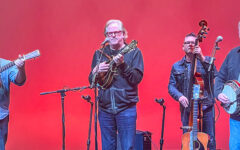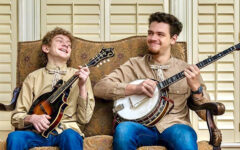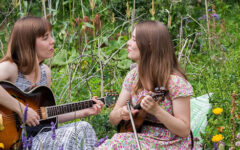
Bronwyn Keith-Hynes – photo by Kaitlyn Raitz
I opened my report on the IBMA Bluegrass Music Awards in Raleigh last month with this vignette…
Arriving with my wife, Arielle, at the 2022 International Bluegrass Music Association awards show at the Duke Energy Center in Raleigh, North Carolina, we saw members of Molly Tuttle’s Golden Highway just behind us. Fiddle player Bronwyn Keith-Hynes and bassist Shelby Means, bedecked in sparkling dresses that would also fit in at the Grammys, were flanked by mandolinist Dominick Leslie and banjoist Kyle Tuttle, looking sharp in their funky attire. They followed us as we walked to a dead end; then we tracked back, only to mistakenly enter the concert hall along with them through the red-carpet doors.
During the performance, Molly Tuttle & Golden Highway didn’t just take the stage; they lit it on fire, taking no prisoners. Inspired by their incredible success and perhaps also bolstered by their IBMA awards, they showed up with a mission. Molly Tuttle won Female Vocalist of the Year and Bronwyn Keith-Hynes won Fiddle Player of the Year – for the second time in a row! It was evident to me why Molly Tuttle & Golden Highway are receiving accolades from the bluegrass community. Yes, they are beautiful, and young, and yes, they look fancy, but man, they can play and sing with the best of them. On songs like Nashville Mess Around, Bronwyn, dressed like a mermaid in her shiny bell bottom pants, played fiddle like the devil was on her trail, chasing her with burning flames.
Bronwyn Keith-Hynes is an acclaimed bluegrass fiddler originally from Charlottesville, Virginia, who now makes her home in Nashville, Tennessee. She currently divides her time between touring with Molly Tuttle & Golden Highway and being a session musician in Nashville. Bronwyn is a graduate of Berklee College of Music in Boston. During her time in Boston, she co-founded and toured all over the world with progressive bluegrass band Mile Twelve, and they won the IBMA New Artist of the Year award in 2020. Bronwyn has performed and recorded with Molly Tuttle, the Milk Carton Kids, Dailey & Vincent, Sierra Hull, Sarah Jarosz, Tim O’Brien, Chris Eldridge, Peter Rowan, Darol Anger, Tony Trischka, Michael Daves, Vince Herman, and more.
Obviously, listeners, fans, and musicians alike have taken notice of Bronwyn. As master fiddler Darol Anger wrote in the liner notes to Keith-Hynes’ debut solo album, Fiddler’s Pastime, “Some have that uncanny precision: in the world of fiddling, it’s a rare and wonderful talent. Some listeners find it bracing, some find it hypnotic. To be able to trust a player’s unerring ability to put the note in perfect tune with everything else that’s going on is a special subliminal gift from the fiddler, saying, ‘I’ve worked hard, so you can relax!’ Bronwyn’s fiddling has all the important qualities that we need in musicians: groove, soul, precision, and wit. She’s always interesting and often heartbreaking. What more could you want in a fiddle player?”
I am looking forward to the many things Bronwyn Keith-Hynes will accomplish in her career.
I had the good fortune to talk to Bronwyn about her awards, Fiddler’s Pastime, and all things music on Halloween, 2022.
MF: So first, I just want to say congratulations on the 2022 IBMA Fiddle Player of the Year award. That’s fantastic.
BKH: Thank you so much.
MF: You have so much to look forward to. How do you think that changed things for you?
BKH: That’s a good question. Yeah, I’ve kind of thought about that. I was so surprised. Winning it two years in a row is mind blowing, and such an honor. It’s something that I hoped in the back of my mind would maybe happen once, at some point in my life, like 20 years down the road if I was very lucky. And to have it have already happened, not once, but twice is very surreal. I feel like it’s something I’ll process in about ten years. I’m still like, “Well, how did this happen?” But winning has made me want to work even harder on my fiddling. I don’t know if it’s to feel like I deserve it. Maybe it’s a bit of that. If anyone thinks I’m worthy of this, I want to do my best. It was inspiring to think that that many people believed in me and thought that much of me, and it’s made me work even harder these last couple of years. And I think, yeah, it also definitely led to some gig opportunities. I got some calls to play on the Grand Ole Opry with Dailey & Vincent, and I hadn’t really met them before, but I think they knew of me because of the award. So that was the first time I got to play on the Grand Ole Opry, last fall right after I won the first time.
MF: That’s exciting. And I do know what you mean. You feel a responsibility. You’re a great violin … fiddle player. Do you call yourself a fiddle player?
BKH: Fiddle player.
MF: I love the name Bronwyn. It’s from the Celtic book, the Mabinogion. Did your parents name you with that in mind, or was it just that it’s a beautiful name?
BKH: My dad’s family is all from Ireland.
MF: Did you grow up in a musical family?
BKH: Neither of my parents played music, but they were always very supportive, and I grew up in an artistic family. My brother and I were into the arts. We were into dance and music, and my parents were incredibly supportive of our creative endeavors. I grew up in an Irish American family. My dad’s parents immigrated from Ireland during World War II. And so, much of my dad’s family are still over there, and we would go to Ireland a lot when I was a kid. That experience exposed me to Irish traditional music. It was one of the first fiddle styles I got into, and I was passionate about that as a kid and a teenager. At that time, I would travel to Ireland for festivals and workshops. It was only when I was about sixteen that I started hearing bluegrass at some fiddle camps. At the time, I liked pop country. Then I started hearing bluegrass and I was like, oh, that music has some of that same kind of twang to it.
A lot of these kids that I was meeting were playing bluegrass – they were going to Berklee College of Music. And I heard that you could study bluegrass there and jazz, and that just sounded interesting to me.
MF: What led you to the violin specifically?
BKH: When I was three, I don’t remember this, but I was told that I was walking past some girls busking on the street with my dad, and I apparently pointed at them and said I will do that.
Which was, I guess, my way of asking for violin lessons. I think my parents thought that was cool and got me some Suzuki violin lessons. And that’s how I started. I remember when I was three, a lot of playing the fiddle was playing with the fiddle on the floor and kind of sawing at it with the bow and doing lots of games. And my Suzuki teacher would also teach me fiddle tunes. Then my parents got me a full-on fiddle teacher, and the rest is history.
MF: Yeah, I had read about your Suzuki lessons. And it’s funny. I mean, I come from New York City. I’m from Queens. I’m as city as you can get. I’m an urban rat. I’m not comfortable unless there’s a truck backing up and blowing smoke in my face.
BKH: What? [laughing]
MF: But hearing the Stanley Brothers on Columbia University’s radio station blew me away. I thought, ‘Wow, that’s cool.’ And then I began investigating and digging and learning more about bluegrass.
And how did you find your way to bluegrass? What pulled you in as opposed to being a classical musician? Or a jazz violinist. I’m sure you’ve played those things, but what made you gravitate towards bluegrass?
BKH: I think it was a combination of the blues and improvisation in bluegrass, and the fact that it was a genre that had fiddle in it. I could see myself playing bluegrass.
I really got into bluegrass when I was a student at Berklee. I think I went to Berklee originally thinking I was going to study jazz and combine jazz and my Celtic backgrounds. That was just my idea, and I really liked those things. But when I got to Berklee there were so many kids playing bluegrass, and there would be these jams and parties pretty much every night. I wanted to be a part of that. I got so inspired and I thought it looked like so much fun. And I just started working hard to learn the repertoire and how to improvise.
MF: Did you grow up hearing bluegrass?
BKH: I only started hearing bluegrass when I was about sixteen. A fiddle camp friend gave me a CD that had all their favorite bluegrass stuff on it, Alison Krauss, and Casey Driessen, The Del McCoury Band, and others. Maybe it would have been cool if I’d been exposed to it earlier, but I think everyone finds their own path, and that’s the way that my musical path happened.
That’s why I sound the way I do. Maybe because I found it later and had to work hard as a late teenager and young adult. I don’t take it for granted.
MF: Well, that’s a good point…The reason I asked is that there are some musical forms that, if you didn’t grow up with it, it’s so hard to acquire the timing and the feel. But you’re so clearly a bluegrass player. There is something different about your playing too. You have a signature style. What would you say is the influence of your formal music education on your playing?
BKH: I didn’t grow up with a music theory background. I had learned folk fiddle styles, like Celtic, and bluegrass, by ear my whole life. In music school I had to learn music theory and learn to name the sounds that I was hearing. I was also learning how to improvise at the same time. That informs the way I think about bluegrass. I come at it a little bit analytically in a sense.
I’m most comfortable learning by ear, but then once I was able to name the things that I was hearing, I was able to learn faster because I could move different sounds into different keys faster, and I could transpose the ideas that I had in one key to another key. And that wasn’t something I would have been able to do before I went to music school.
That helped because in bluegrass you have to know the keys and you have to know where you are on your fingerboard.
MF: There is something in your sound that’s very sharp. It’s very precise. It is very satisfying to my ear. You have a certain attack when you enter a song, like a bolt of lightning striking ground. It’s spot-on and very pleasing to hear. There’s a mastery there. That really comes across.
Your debut, Fiddler’s Pastime, is a great album. I can hear you straddling the world of traditional bluegrass while incorporating other ideas as well. You’ve managed to really find a balance that works.
BKH: Thanks. That’s hard. It’s hard to figure out how to make your own stamp on a musical tradition that’s so old and has so much history.
MF: It must have been hard to move on from Mile Twelve.
BKH: Yeah, that was such a hard decision to make that I always say that was, I don’t know, the hardest decision I’ve ever had to make in my life so far. But I feel good about my decision, and I think it was the right thing for myself and the band. I’m glad that they’re carrying on and doing great. They’ve got a killer new fiddler. Ella Jordan is amazing and adds something new to the band too in that she’s a great singer. They’ve got some great female vocals in there now.
Leaving Mile Twelve pushed me to move on and to be in a new musical environment. That was terrifying. But it was also very exciting. And I was like, “Can I live with myself if I don’t take this opportunity?”
MF: Yeah, I mean, it’s the kind of thing where if stuff doesn’t scare you then you’re probably not trying hard enough.
Molly Tuttle & Golden Highway were great fun to see at the 2022 IBMA show. I don’t know if you recall, I was walking with my wife and you guys followed us down the wrong path to a dead end. We all had to walk across the grass to the right entrance. It was funny because you guys are all giants. I mean, maybe you were all wearing high heels or whatever, but it was like, my God, look at these beautiful gigantic creatures. I whispered to my wife, “that’s Golden Highway. Don’t make too much of a big deal about it.” And then Arielle and I inadvertently went into the red-carpet entrance along with you guys.
During the performance you guys were fun to watch. I loved the outfits. You had on bell bottom mermaid pants! And of course, there was no shortage of amazing playing. You guys were on fire. You took no prisoners.
BKH: I feel like every crowd that we’ve played for this year has been great. Such terrific crowd response and positive energy. Everyone in the band gives so much energy, stage presence; it’s like we all kind of feed off and inspire each other. Obviously, the focus is on the music, but we also try to bring in a sort of energy level and show level for the audience, and us too. I’ve thought about this a lot. Many of my bluegrass heroes weren’t or aren’t jumping around the stage.
It never really occurred to me that that would be something I would do, but I think if you get a little bit of the jamgrass influence, and people can be more active because they’re plugged in, they can get away from the mics and dance around. I don’t know, it’s fun. The crowd responds.
MF: A great show is a great show. I mean, Bill Monroe put on a great show. Maybe he did it in a different manner, but he put on a show. It would be one thing if you all weren’t such phenomenal musicians. But the musicality is so crisp and excellent. I mean, you don’t have laggers in that band.
BKH: No we don’t. And Molly’s just such an amazing band leader. She can do all that stuff just by herself and put on an amazing show.
MF: True, but you all bring something unique to the band. I love Kyle Tuttle’s version of John Hartford’s Up on the Hill. I can see that Molly is the architect and leader, but it’s clear that the whole band is bringing a lot too. That’s why it works so well.
Going back to your album, one thing I love about Fiddler’s Pastime is that you really give a lot of other people the chance to shine. You’re very prominent throughout the whole album, you wrote many of the songs, and it has your imprint, but other folks get a chance to step out. I think that takes a lot of courage and generosity, too. Having Sierra Hull, Tim O’Brien, and all these amazing players and giving them the center stage.
BKH: I was so honored that all those players were willing to come on and record on my album. It was surprising when people kept saying yes. That’s like, “Oh, no, what have I gotten myself into here?” I just thought that was a cool thing. I wasn’t at a point where I was really working on my singing very much, so I invited folks to sing. I’m not going to sing if I haven’t even been really working on it. I’ve been working on the fiddle, but I didn’t want to just make an instrumental record because I love playing with a vocalist so much. It’s a big part of what I do, so I wanted to showcase that. And I thought that would probably be enjoyable for the listener too. I like a show with vocals in there too.
MF: I agree, it’s nice to hear a song too amid instrumental playing. I’m sure you can sing. I’ve heard you singing harmonies. Are you looking to consider doing singing and vocals in your next project?
BKH: Yeah, I’m kind of starting to wrap my head around another solo album, and I think it will have some of my singing on there. The one drawback of doing Fiddler’s Pastime the way I did it was I realized that it would be very hard to do a tour or even a show featuring all that music because it has so many different special guests who are very busy and have other things going on. To round up that many people to try to do a show like that would be very challenging.
I was like, “Alright, this was super cool. But the next record I do, I want it to be a record that I could go out and perform.”
MF: Wes Corbett produced Fiddler’s Pastime. Fantastic production. And you recorded it in five days.
BKH: Yeah, there were a couple more, I think I came back for maybe two more days of fiddle overdubs. During those five days I was trying to make sure everyone else was done and happy and could go on their way. And then I kind of left all my stuff for another couple of days. So, it was maybe more like seven or eight days.
MF: Yeah. And you have all those players, and it sounds like some of the team that Wes has worked with before, like Ben Surratt and Dave Sinko.
BKH: I’m not sure if Wes had recorded with Ben, but I had with Mile Twelve. We had done a full-length album with Ben the year before. I felt comfortable at his studio, and I knew that he would get great sounds, and, yes, Wes has worked a lot with Dave Sinko. Yeah. So that combination was awesome.
MF: One thing that I thought was interesting is you put the album out independently. You had a group of A-team players and a recording crew that worked together. Would you say to other musicians, go ahead and give it a whirl, to put out an album independently.
BKH: It really depends. I think there’s pros and cons to it. I think for myself, in the situation I was in, I had just been a part of several Mile Twelve albums that were all released independently. I had helped with putting those out. I’d kind of gone through that process several times in the last couple years so I felt like I had a pretty good idea of what needed to happen and how to do it.
And I had the money to put it out myself. Financial consideration is a critical part of it. You can do it all yourself if you’ve got the money up front, but if you don’t, you may need the help of a record label to pay for some of the upfront costs, then you’ll need to reimburse them from the money that the record makes.
MF: Yeah, it gives you a lot more autonomy, right?
BKH: Yeah, exactly. You don’t owe anybody anything. It was a lot of work. But it was 2020, during the pandemic, and I didn’t have anything going on. I was completely out of work. I was teaching Zoom fiddle lessons from home. But I had a lot of time to just figure things out. I even did all the publicity myself just because I had the time and thought it would be fun to try. I didn’t really know what I was doing, and I made a few mistakes along the way, but nothing irreversible, and I learned a ton. It was a lot of work and I think at this point I will hire people to help me out on the next one. I don’t think I’ve got it in me to do it again on my own, now that my touring schedule is so busy, but it was definitely empowering to go through that process once.
MF: It’s a fine record. An excellent contribution to bluegrass. I guess young musicians would have to find A-team players and production folks to make something this excellent.
BKH: Things are a lot different than they were twenty years ago. And it is totally possible for anyone to put out their own music, which is cool; it opens the door for a lot of people. People who are just starting out or whatever. I think it’s cool, but it takes some time.
MF: I really love all the songs. I spoke to Peter Rowan about your cover of Last Train. He said he was very honored that you chose to do that song. Was there a specific reason you opted to do that one specifically?
BKH: I was searching high and low for a song for Sarah [Jarosz] to sing on the record when she agreed to sing something. I wanted something kind of vibey, a little bit bluesy and kind of spooky. Just something that would kind of show off her range. I wanted something that could just get a little weird.
MF: Yeah, yeah. And she does the yodel!!!
BKH: Yes, I love that. That’s my favorite part of that.
MF: And I see in the liner notes you said that song reminded you of your Boston bluegrass jam sessions. And of course, you know, Peter is from Boston. Well, from Wayland, Massachusetts.
BKH: Yeah, that was kind of a nice coincidence. It wasn’t intentional, but yeah, that was nice it worked out that way. Sarah and I were in school together in Boston, at the same time at different schools, but right around the corner from each other. We’d end up in some jams together, she’s always been incredible. And that’s where I met Wes too, he was teaching at Berklee and I took some lessons from him. He was a mentor.
MF: Is it hard to play a fiddle duo, like you did with Laura Orshaw?
BKH: I love what Laura brought to the title track of Fiddler’s Pastime. At that point we’d been doing a lot of twin fiddling with her band, The Po’ Ramblin’ Boys at different festivals we’d both end up at. We were pretty dialed in in terms of knowing each other’s feel and stuff. So that kind of thing was easy. We’ve got a system where we’ll send each other voice memos. I’d send her the lead, or she’d send me the lead. We’d go back and forth. We even had a whole spreadsheet and a Google Doc with all the twin fiddle songs we knew, and recordings of each part. It was very organized.
MF: I love Sierra’s contribution to Open Water. Her playing just jumps right out. She’s a fine mandolin player. And a terrific singer. I’ve been listening to her catalog. I love the variety of her music.
BKH: Yeah. Oh, gosh, she’s one of the best. Her playing is kind of flawless. Every take she does she would play something completely different and brilliant. It was all brilliant. And it was all different. It was completely inspiring.
MF: But you made a lot of great choices in bringing on the right people that brought character and different sounds and styles to your album. I love the vocal tunes. Hello Trouble is terrific. I read that when James [Kee] learned that Tim was going to sing on the song he was blown away.
BKH: Yeah, he was so excited. He had never gotten to record with Tim before, so he was super stoked. I wish they’d been able to come in on the same day. I think Tim came in later and sang over James’s stuff, so he didn’t get to hang with him in the studio.
MF: Do you think you’d ever put out an album of Celtic music or just Celtic songs on your record?
BKH: I don’t think I would at this point. I think I identify too much as a bluegrass fiddler. I mean, maybe, you never know. Life is long, and I love that music so much, but I don’t feel like I identify with it anymore. I have a deep love for Celtic music, but that’s not me anymore.
MF: There are deep connections between Appalachian and Celtic music, but yeah, I understand.
BKH: I just focused on bluegrass for so long, to get away from Irish music, to get away from that feel so I could sound bluegrass enough, that it would take a long time to want to go back. I’ve worked so hard to do this now, but it’s in there. The thing is the Irish music is in there so deep that it’s still very natural. Like I could just pick it up and play something that sounds pretty darn Irish, I think. And it’s just, it’s in there in a certain way. I think that any music that you study as a kid is just ingrained.
MF: Would you ever record something outside of the bluegrass realm?
BKH: Maybe. Yeah, I don’t know. I mean I love country music. I love Americana music. I love jam band music, so I could see going towards any of those genres. I think the skills you end up with as a bluegrass player translate to you being able to play on lots of different stuff, even if maybe it’ll sound like a bluegrass player playing on different stuff, but at least you can do it.
MF: Right. Well, you know Bill Monroe’s famous for saying to Peter Rowan, “If you can play bluegrass, you can play any kind of music.”
BKH: Yes, he was right.
MF: What kind of stuff do you listen to?
BKH: I’m obsessed with Sturgill Simpson. I’ve listened to Sturgill Simpson nonstop for the last five years or so. I only have a few albums that are saved on my Spotify that I can listen to on planes, and most of them are Sturgill Simpson albums. I like the electric stuff and I was thrilled when he did a bluegrass record. I was like, “Oh, these are all my favorite songs,” and now there’s a bluegrass version with Stuart Duncan playing fiddle.This is like Christmas come early.
So I love his stuff. And other music in that vein, kind of like the modern outlaw country stuff. And I like the old stuff, Waylon Jennings and Willie Nelson and all that kind of outlaw country vibe. I listen to lots of bluegrass stuff too.
I think I used to listen to more different things. I used to listen to a lot more jazz and funk and in the last five years or so, moving to Nashville, my view has narrowed a little bit into bluegrass and country because I feel like there’s so deep you can go just with that kind of stuff.
I don’t know. I still feel like I don’t know anything about any of those genres, and I’ve been trying to study them for the last fifteen years.
MF: Is there someone that you’d like to play with that you haven’t played with yet?
BKH: Sturgill Simpson. Yeah, if you’ve got any hookup [laughing].
MF: Wait, let me make the call. [Picks up an imaginary phone.] Uh, you know, you’ll get the invite.
BKH: Yeah, sure. I’ll probably think of more people as soon as we hang up.
MF: You’ve achieved so much at a young age. [I was trying not to ask Bronwyn her age.]
BKH: I am thirty. Yep.
MF: So geez, my older son is twenty-six, you know…
What do you see next in the near term? You’ve alluded to another album. Can you give us some detail about what that might sound like?
BKH: I’ve got a recording session in four weeks for the first batch of songs, but I don’t know. I don’t want to say too much about it yet ’cause I’m not sure what’s going to happen, and I’m a little nervous about it all because, you know, musicians always get nervous about that kind of stuff. The plan is to keep touring with Molly & Golden Highway, and in my spare time put together another solo album. I feel like it’s been long enough since my last solo record that I’m ready. I’ve got more ideas and I feel like I’ve got another one in me. Maybe it’ll come out sometime next year, but I’m not sure what the timeline looks like yet.
MF: You’ll write songs in the van, like on Fiddler’s Pastime [laughing].
BKH: Yeah, exactly. Yeah, yeah.
Thank you so much for being interested and taking the time to talk.
MF: Well, thank you. It’s a real joy and it’s just nice and fun to talk to you.







